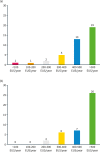A portrait of Endoscopic retrograde cholangiopancreatography and endoscopic ultrasound training programs in Europe: Current practices and opportunities for improvement
- PMID: 37022193
- PMCID: PMC10165314
- DOI: 10.1002/ueg2.12377
A portrait of Endoscopic retrograde cholangiopancreatography and endoscopic ultrasound training programs in Europe: Current practices and opportunities for improvement
Erratum in
-
Correction to "A portrait of Endoscopic retrograde cholangiopancreatography and endoscopic ultrasound training programs in Europe: Current practices and opportunities for improvement".United European Gastroenterol J. 2023 Sep;11(7):710-711. doi: 10.1002/ueg2.12434. Epub 2023 Jun 30. United European Gastroenterol J. 2023. PMID: 37389807 Free PMC article. No abstract available.
Abstract
Background: Endoscopic retrograde cholangiopancreatography (ERCP) and EUS are challenging procedures requiring a high level of expertise to provide effective and safe patient care. Thus, high-quality training is needed to achieve competence. We aimed to evaluate the status of European ERCP/EUS training programs, to evaluate adherence to international recommendations, and to propose possible solutions for future improvements.
Methods: A web-based survey was developed and ERCP/EUS experts and trainees across Europe were invited to participate.
Results: Forty-one experts (out of 50; 82%) and 30 trainees (out of 70; 42.9%) from 18 countries answered the questionnaire. The training program application process is mainly driven by individual requests (87.8%). All surveyed departments offer combined ERCP/EUS training and the majority have adequate facilities and trainers. Although centers are high-volume and provide long-term fellowships, trainee hands-on exposure is not very high (43% expect to do (or did) 100-150 ERCPs and 69% up to 150 EUSs). A formal curriculum is in place in 53.7% centers, including simulation-training in 27.3%. Competence is assessed in 65.7% of centers, but validated tools are applied in only 33.3%.
Conclusions: This survey first provides an overview of ERCP/EUS training programs across Europe. It shows that there is adherence to international guidelines to a certain degree, but several gaps in the application process, use of simulators for training, training curriculum and assessment of performance have been recognized. Overcoming these shortcomings could serve as a basis for further improvement in ERCP/EUS training.
Keywords: Curriculum; ERCP; EUS; Europe; training.
© 2023 The Authors. United European Gastroenterology Journal published by Wiley Periodicals LLC on behalf of United European Gastroenterology.
Conflict of interest statement
The authors have no conflicts of interest to declare.
Figures




References
-
- Bisschops R, Dekker E, East JE, Johnson G, Pimentel‐Nunes P, Sanders DS, et al. European Society of Gastrointestinal Endoscopy (ESGE) curricula development for postgraduate training in advanced endoscopic procedures: rationale and methodology. Endoscopy. 2019;51(10):976–9. 10.1055/a-1000-5603 - DOI - PubMed
MeSH terms
LinkOut - more resources
Full Text Sources

